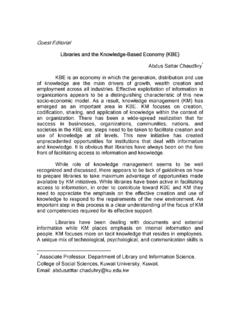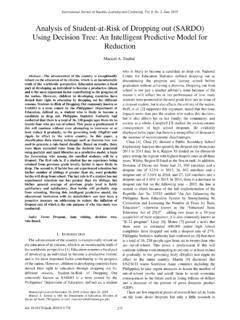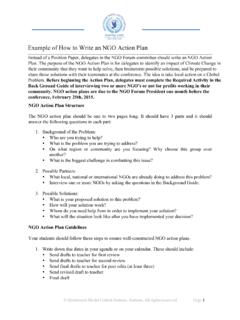Transcription of STUDENTS’ ATTITUDE TOWARDS MATHEMATICS
1 75. Pakistan Economic and Social Review Volume 46, No. 1 (Summer 2008), pp. 75-83. students ' ATTITUDE TOWARDS . MATHEMATICS . MUHAMMAD SHAHID FAROOQ and SYED ZIA ULLAH SHAH*. Abstract. students ' success in MATHEMATICS depends upon ATTITUDE TOWARDS MATHEMATICS . It also influences the participation rate of learners. This study was based on a survey of high school students about their attitudes TOWARDS MATHEMATICS . students of both the gender constitute the population of this study. Sample of the study was 685 students (male = 379 and female = 306) of 10th grade selected conveniently from 10 private and public sector schools. A. questionnaire ( = ) was used to examine the attitudes of male and female students TOWARDS MATHEMATICS at secondary school level. Descriptive statistics and t-test with P < level of significance were used for data analysis.
2 I. INTRODUCTION. ATTITUDE TOWARDS MATHEMATICS plays a crucial role in the teaching and learning processes of MATHEMATICS . It effects students ' achievement in MATHEMATICS . The teaching method, the support of the structure of the school , the family and students ' ATTITUDE TOWARDS school affect the attitudes TOWARDS MATHEMATICS . Usually, the way that MATHEMATICS is represented in the classroom and perceived by students , even when teachers believe they are presenting it in authentic and context dependent way stands to alienate many students from MATHEMATICS (Barton, 2000; Furinghetti and Pekhonen, 2002). Researches concluded that positive ATTITUDE TOWARDS MATHEMATICS leads students TOWARDS success in MATHEMATICS . Attempt to improve ATTITUDE TOWARDS MATHEMATICS at lower level provides base for higher studies in *The authors are Lecturers at Institute of Education and Research, University of the Punjab, Lahore-54590 (Pakistan).
3 76 Pakistan Economic and Social Review MATHEMATICS . It also causes effect in achievement of MATHEMATICS at secondary school level (Ma and Xu, 2004). Girls are often discouraged from mathematical work in their primary years. They therefore dislike it in the secondary years. So they drop it at high grade levels in far greater numbers than boys. As a result, fewer women are employed in industry in post needing mathematical ability (Arnot, David and Weiner, 1989). Male and female learners of MATHEMATICS have almost same type of achievement scores, because this gender based gap is decreasing day by day. But still research indicates that this difference prevails in some areas of complex mathematical tasks. ATTITUDE is based on value and belief, as well as varying degree of factual knowledge (Mullis, Martin, Gonzalez, Conner, Chrostowski, Gregory, Garden and Smith, 2001).
4 Still the consequences about the gender differences in subject of MATHEMATICS are not conclusive because there are so many other factors which contribute TOWARDS achieve- ment (Leder and Taylor, 1995; Leeson, 1995; Malone and Miller, 1993). Poor ATTITUDE TOWARDS MATHEMATICS has often been cited as one factor that has contributed to lower participation and success of girls in MATHEMATICS . (Willis, 1995; Fullarton, 1993). Interest and ATTITUDE in the subject are the special predictors for the students ' participation and success in the subject. Gender based differences are due to the individual's perception of own abilities and the sex role (Schiefele and Csikszentmihalyli, 1995). Costello (1991) reported that almost all literature on this topic points to the commonly held perception that doing MATHEMATICS is consistent with a male self-image and inconsistent with a female self-image.
5 This self image is usually caused by the peer pressure. Males are more inclined TOWARDS MATHEMATICS than females on being the male dominated domain. It is found that at secondary school level most of the girls don't actively participate in MATHEMATICS classes due to their poor perceptions about MATHEMATICS . Girls are negatively influenced by their sex-role stereotypes (Boswell, 1979;. Fennema and Sherman, 1977; Sherman, 1882; Leder, 1982 and Ethington, 1992). Poor mathematical skills in women deprived them from a large number of professions because in some countries mathematical background knowledge is the pre requisite for entrance in any profession. Sex differences are the serious concerns for the communities (Willis, 1995; Cuttance, 1995;. Barnes and Horne, 1996). In this era of science and technology, every field of life has been tremendously changed so it is necessary to compare the attitudes and achievements in MATHEMATICS on gender basis.
6 It will support us for designing programs and strategies for participation of girls in FAROOQ and SHAH: students ' ATTITUDE TOWARDS MATHEMATICS 77. MATHEMATICS at higher level. It's a common observation that at higher levels females take MATHEMATICS quite lesser than the male students . Ultimately the males fill more vacancies based on knowledge of MATHEMATICS than the females. Females do not prefer MATHEMATICS at higher level because they perceive it as a male domain. All professions requiring higher level knowledge of MATHEMATICS are dominated by male community. Many barriers are there for the female students to have their career in MATHEMATICS . Some times they feel pleasure in taking MATHEMATICS but their parents consider it as a useless effort for them. Sometimes female students ' show less confidence in MATHEMATICS than their male counterparts.
7 Their attributions of failure and success also differ (Leder, 1984; Subotnik, 1988;. Cohen and Kosler, 1991; Hanson, 1992; Dickens and Cornell, 1993). Several measures and intervention programs has been designed for improving females ATTITUDE TOWARDS MATHEMATICS (American Association of University Women, 1992; Mulryan, 1992). Observations and researches indicate that women are clustered in the life sciences with far fewer in physical sciences, MATHEMATICS , and engineering and computer science . (Gavin, 1997). Ainley and Fordham (1991) contributed for the excellence of school life and its relationship with other features. They investigated the student teacher relationship and concluded that student's satisfaction with school is not correlated with his academic success. This was concluded on the basis of the studies conducted on attitudes TOWARDS MATHEMATICS .
8 Teachers of MATHEMATICS tried to find out relationship of ATTITUDE with student's performance in MATHEMATICS during the last decade. They came to know that teaching learning process of MATHEMATICS depends upon the positive ATTITUDE TOWARDS MATHEMATICS . Serious efforts should be made to develop and gauge the positive ATTITUDE TOWARDS MATHEMATICS . Student's confidence is another ingredient for education of MATHEMATICS . Having a positive ATTITUDE TOWARDS MATHEMATICS means generally enjoying working with MATHEMATICS and having confidence in one's own ability to do it but it does not mean that a student will display this positive ATTITUDE TOWARDS the whole area of MATHEMATICS all the time (Robson, 1996). Majority of the students love MATHEMATICS but those who dropout due to MATHEMATICS have a different viewpoint about it. It leads TOWARDS the fact that MATHEMATICS is a rough and tough subject.
9 It is the ATTITUDE of the student which contributes a lot TOWARDS his perception about MATHEMATICS . It develops the adaptability and applicability in the learners (Booker, Briggs, Davey and Nisbett, 1992;. Schiefele and Csikszentmihalyi, 1995). students should be encouraged and prepared for accepting the challenges of day to day life (Mathematical Sciences Education Board and National Research Council, 1989). A study 78 Pakistan Economic and Social Review was needed to see the ATTITUDE of Pakistani students TOWARDS MATHEMATICS . This study will answer the possible questions regarding the ATTITUDE and achievement in MATHEMATICS . NULL HYPOTHESES. H01: There is no significant effect of gender on student's ATTITUDE TOWARDS MATHEMATICS at secondary school level. H02: There is no significant difference in confidence of male and female students TOWARDS MATHEMATICS at secondary school level.
10 H03: There is no significant difference in male and female students about the usefulness of MATHEMATICS at secondary school level. H04: There is no significant difference in male and female students about the MATHEMATICS as male domain at secondary school level. H05: There is no significant difference in male and female students about the MATHEMATICS teacher perception at secondary school level. II. METHOD AND PROCEDURE. The following methods and procedures were adopted to conduct this study. POPULATION AND SAMPLE. students of both the genders constitute the population of this study. Sample of the study was 685 students (male = 379 and female = 306) of the 10th grade from five private and five public sector schools selected conveniently. INSTRUMENT FOR THE STUDY. Attitudes were measured by using Urdu translated Fennema-Sherman MATHEMATICS ATTITUDE Scale.
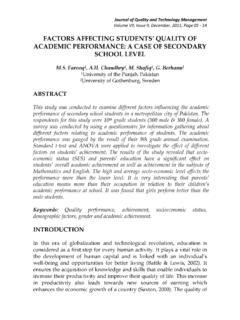



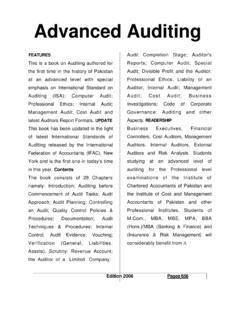

![nÁ0` h]´ VP h^ÄE°h´ÅÊQ⌦µh^˨½ DÅ⌦En¨½ À¹ ÌÄjÅ⌦ÊPÅj {´Ì](/cache/preview/7/8/7/0/6/2/b/7/thumb-787062b7e87e0e8e4ae0396a2098f16c.jpg)

